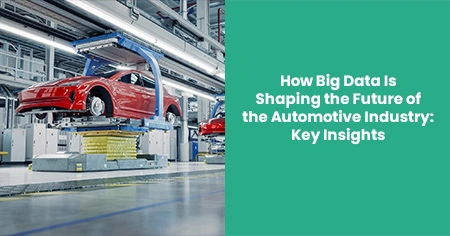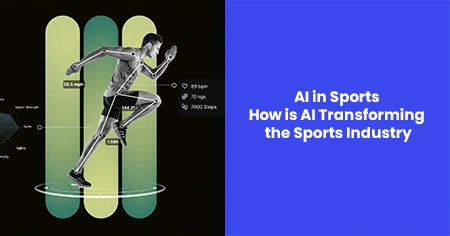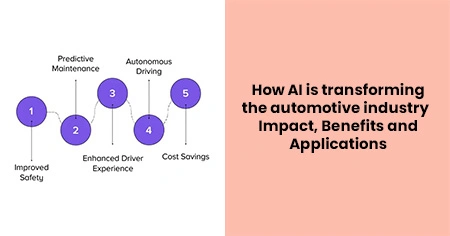Today's autos generate massive amounts of data, from production to the route they take and the care they require. Businesses use big data to generate relevant information, improve process efficiency, raise customer happiness, and gain a competitive advantage.
The advent of connected cars, IoT, and advanced analytics tools has resulted in enormous data that may be used to transform the sector. Analytics improves quality control, inventory management, and supply chain optimization, among other areas. In this post, we will show how big data is transforming the automotive software development for the future.
Benefits of Big Data Analytics in the Automotive Industry

The advantages of applying big data analytics to the automotive business are numerous. Cost savings are one of the most significant benefits. Companies can also significantly decrease costs by managing the supply chain and manufacturing processes effectively. Big data analytics also enhances efficiency by enabling firms to make faster decisions by identifying bottlenecks in certain operations. Another benefit is increased safety, as predictive efforts reduce accidents and ensure vehicle functionality. Furthermore, conducting client transactions and delivering personalized solutions increases satisfaction and loyalty, giving organizations a competitive advantage over competing enterprises in the market. Snippet: For those looking to develop skills in this area, an online data analysis course for beginners can provide foundational knowledge in understanding and leveraging data to drive decisions in the automotive industry.
Use Cases of Big Data in the Automotive Industry
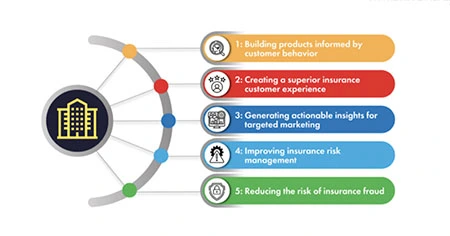
Predictive maintenance and quality control
Analytics can help firms forecast when cars require maintenance, minimizing downtime and expenses. By evaluating data from sensors and other sources, companies can discover possible quality concerns and take corrective action before they become major problems.
Inventory management and supply chain optimization
Analytics can help businesses optimize their inventory levels, lowering the risk of stockouts and surplus inventory. Organizations can improve their operations by studying supply chain data and identifying inefficiencies.
Sales and marketing analytics
Big data can help businesses obtain insights into customers' tastes and behaviour, allowing them to customize their marketing and sales activities to match their demands.
Organizations can use data from social media and other sources to detect trends and patterns in customer behaviour, allowing them to create more effective marketing efforts.
Autonomous vehicle development and safety
Analytics can play an important part in developing self-driving vehicles, allowing firms to test and refine their systems. By evaluating data from sensors and other sources, companies can identify potential safety hazards and take corrective action before they become problems.
Transforming the customer experience
Automotive businesses must recognize and understand their consumers' needs. This technology allows us to collect data on people's behaviour, driving, purchasing, and service history to better target customers. Telematics in linked vehicles provides timely servicing warnings, intelligent routing, job ideas, or part upgrade suggestions.
Big data personalization solutions enable businesses to offer their products more efficiently to clients, resulting in higher customer satisfaction.
Creating tailored driving experiences
In addition to predictive maintenance and safety, big data enables individualized driving experiences. Automobile manufacturers can customize the in-car experience depending on individual driver behaviour and preferences. Below are some instances of tailored driving experiences:
Adjusting vehicle performance to meet driver preferences, providing personalized services like restaurant or gas station recommendations, and customizing the in-car entertainment system.
Providing real-time traffic reports and alternate route suggestions based on driving habits.
Vehicles feel more like extensions of drivers than ever before, thanks to big data, which enables pre-configured parameters like temperature and seat adjustments and personalized infotainment systems.
Improving fleet management
Fleet operations today rely heavily on big data and analytics to run efficiently. Tracking the condition of cars, the gasoline used by drivers, and the behaviour of the drivers allows a company to plan the most appropriate routes to be travelled, save fuel expenses, and maintain vehicles at the proper time. Serious driving habits can also be quickly caught using analytics technologies, increasing the safety of the driver and the passengers. Such data is helpful for ride-sharing and logistics companies, which must maximize their services while remaining profitable.
Big data inside the automotive supply chain
Big data plays a vital role in streamlining the automotive software development. Companies can improve their operational efficiency and effectiveness by leveraging the opportunities provided by multi-scale data analysis, multiple types of data, and real-time processing. This, in turn, results in faster, more efficient, and cost-effective material delivery, thus improving the overall manufacturing and transportation process.
Furthermore, by collecting and analyzing data on the performance of people and production line equipment, businesses can identify areas for development and better production efficiency. Sensors on manufacturing equipment provide essential data such as temperature, humidity, workload, and production efficiency, allowing for early optimization and maintenance to avoid equipment failure. Using past maintenance data will enable companies to plan maintenance tasks more effectively, reducing downtime and minimizing risk to the enterprise.
Enhancing navigation systems and driver assistance
Navigation systems have progressed well beyond simply pointing vehicles in the correct direction. Big data has helped these systems enhance their accuracy and effectiveness, and they now provide real-time traffic information, alternative routes, and even predictive maintenance notifications. Similarly, data powers modern driver assistance systems, which improves road safety and operating efficiency.
Challenges to Implementing Big Data in the Automotive Industry
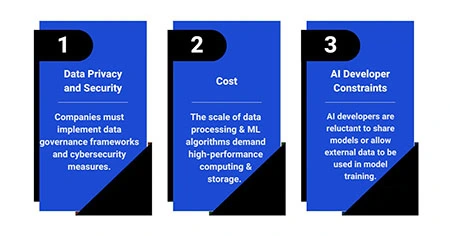
While big data and analytics greatly benefit the automobile industry, firms encounter various hurdles when using these technologies. This includes:
Data collection and storage: Gathering and storing massive amounts of data can be complex, especially when dealing with real-time data from linked vehicles and other sources.
Data quality and accuracy: Ensuring data quality and accuracy can be challenging, especially when working with data from many sources.
Data privacy and security: Protecting sensitive data from cyber threats and illegal access is critical in the automotive business, as customer information and intellectual property are at stake.
Organizational resistance and adoption: Implementing big data and analytics can be difficult, especially if staff are unfamiliar with these technologies.
Future of Big Data Analytics in the Automotive Industry

Given a handful of upcoming deadlines, the outlook for big data analytics in the automobile sector is positive.
Artificial intelligence will improve accuracy and save time in data analysis and decision-making. These improvements, combined with edge computation, which aims to process data closer to the source, will increase efficiency and reduce latency. Sustainability will also receive much attention, and the big data analytic system will help to use energy more efficiently for electric vehicles and ecologically friendly activities.
The integration of connected cars and the Internet of Things (IoT) is projected to open up new prospects for analytics in the automotive industry. By gathering real-time data from connected automobiles, enterprises may acquire insights into driver behaviour, vehicle performance, and road conditions, enabling them to manage their operations and improve the customer experience. Furthermore, as the smart city platform evolves, today's vehicles will integrate with city systems, improving traffic and transportation.




